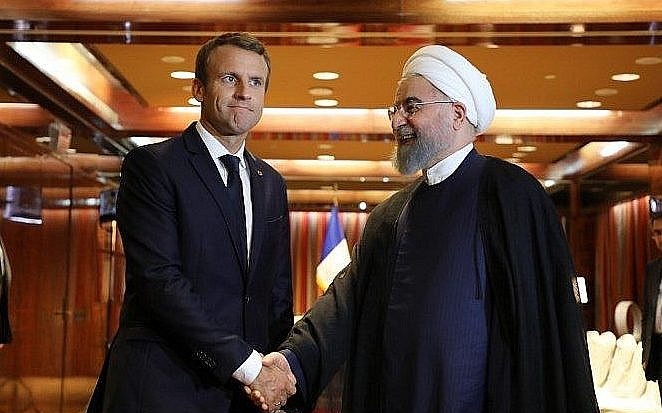French President Emmanuel Macron (L) and Iranian counterpart Hassan Rouhani, New York, September 19, 2017 (Ludovic Marin/AFP)
France has put a significant condition on its offer of an economic link with Iran to salvage the 2015 nuclear deal, saying the Trump Administration must support Paris’s extension of a $15 billion line of credit.
After a month of mediation by French President Emmanuel Macron, Iranian Deputy Foreign Minister Abbas Araqchi held 10 hours of talks in Paris on Monday.
The French are seeking Iran’s return to all provisions of the 2015 agreement with the remaining 5+1 Powers (France, UK, Germany, China, and Russia), in return for measures buffering the effect of comprehensive US sanctions imposed last November.
Iran Daily, September 3: 10-Hour Talks Between Iranian and French Officials Over Nuclear Deal
French Foreign Minister Jean-Yves Le Drian told reporters, “[We will] exchange a credit line guaranteed by oil in return for, one, a return to the JCPOA [Joint Comprehensive Plan of Action]…and two, security in the Gulf and the opening of negotiations on regional security and a post-2025 (nuclear program).”
But he then added the crucial condition, “All this supposes that President Trump issues waivers.”
The Trump Administration, which withdrew from the nuclear agreement in May 2018, initially gave 6-month waivers from the November sanctions for Iran’s largest oil customers, including China, India, South Korea, Japan, and Turkey. In May, the Administration refused to extend the waivers, seeking to reduce Iranian oil exports to zero.
Without the US waivers, international banks may refuse involvement in any French-Iranian arrangement, for fear that they would face American sanctions.
A “source aware of the negotiations” said, “The question is to know whether we can reach this ($15 billion) level, secondly who will finance it, and thirdly we need to get at the very least the tacit approval of the United States. We still don’t know what the U.S. position is.”
In February, the European Union launched a mechanism, INSTEX, to bypass US sanctions with non-dollar trade in Iranian oil and other commodities and goods. But Tehran’s leadership refused the arrangement because of “humiliating conditions”: the EU’s concern over missiles, Iran’s activities in the Middle East, and alleged involvement in bomb and assassination plots in Europe.
A “senior Iranian official familiar with the negotiations” pushed away the condition of Trump Administration support:
France has offered the credit line of $15 billion but we are still discussing it. It should be guaranteed that we will have access to this amount freely and also Iran should be able to sell its oil and have access to its money.
French Finance Minister Bruno Le Maire will be in Washington on Tuesday for discussions.
The US State Department referred questions to the White House, which did not comment.
Zarif Repeats: Iran Suspends Commitments If No Deal
A second Iranian official said to Reuters: “Although the EU and particularly France have goodwill, they should convince the U.S. to cooperate with them….If not, Iran is very serious about decreasing its nuclear commitments. There is no logic to respect the deal, if it has no benefits for us.”
Iranian Foreign Minister Mohammad Javad Zarif repeated on Tuesday that Tehran will further suspend its commitments under the JCPOA, unless European powers give assurances by Thursday.
The Foreign Minister said on Sunday that “we will write a letter to the Europeans…announcing the implementation of the third step” if there was no agreement on the economic link, needed as Iran’s oil exports have fallen by up to 95% since April 2018
Speaking during a visit to Bangladesh yesterday, Zarif said President Hassan Rouhani will soon announce details of the “third step” of suspension.
Iran has already broken the deal’s limit on stocks of 3.67% uranium, raised enrichment to 4.5%, and resumed construction of the Arak heavy-reactor, halted under the agreement pending a redesign to prevent by-product of plutonium, which can be used for nuclear warheads.
Zarif has not specified the “third step” but officials — including President Hassan Rouhani — have indicated that Iran will return to its pre-2015 enrichment of 20% uranium, which potentially can be further enriched to 90% grade for use in a military nuclear program.


“[We will] exchange a credit line guaranteed by oil in return for, one, a return to the JCPOA [Joint Comprehensive Plan of Action]…and two, security in the Gulf and the opening of negotiations on regional security and a post-2025 (nuclear program).”
“But he then added the crucial condition, “All this supposes that President Trump issues waivers.”
So, the monsiuer french minister just likes to hear himself talk, or maybe Elise palace is cold these days and he is trying to warm up the air